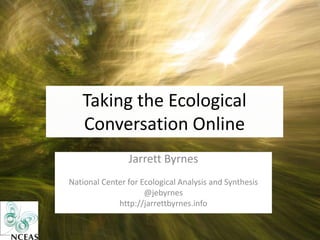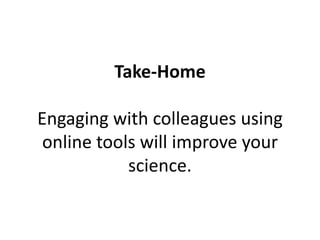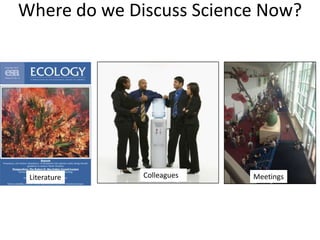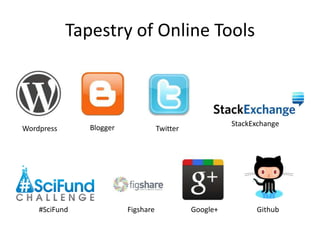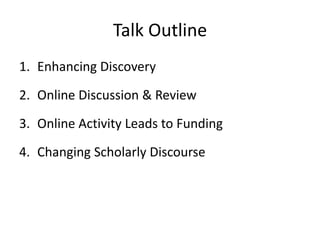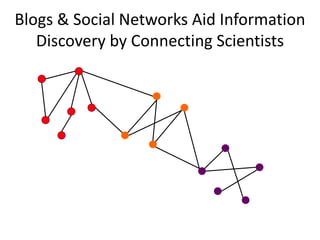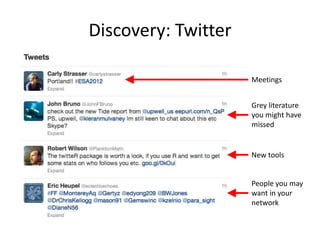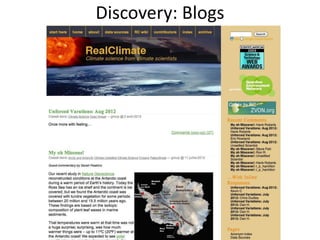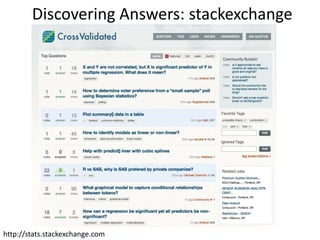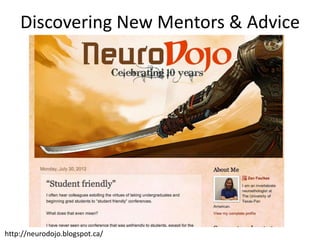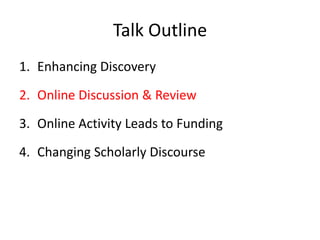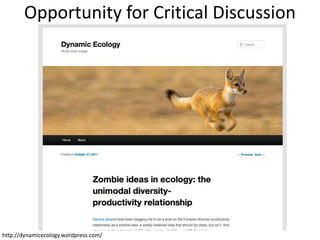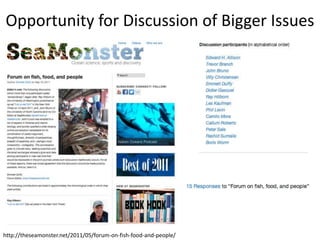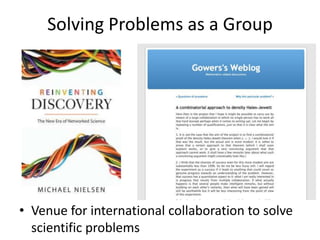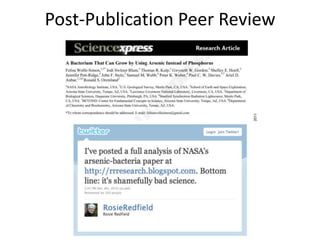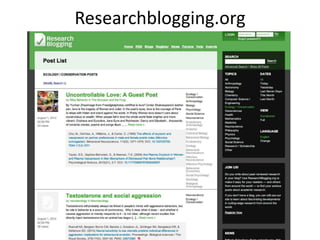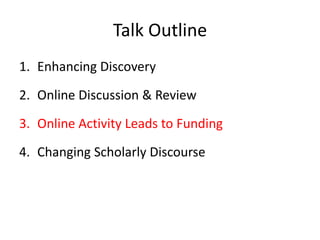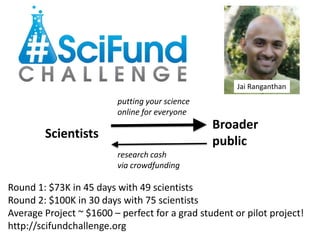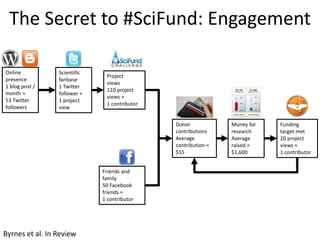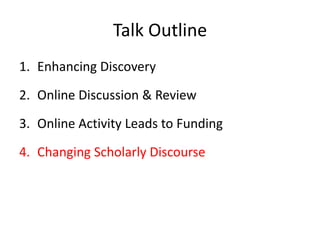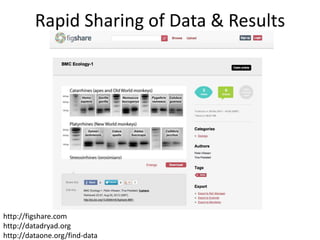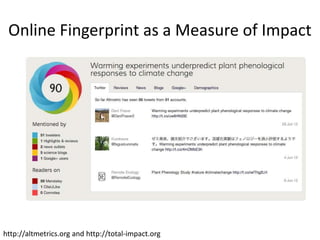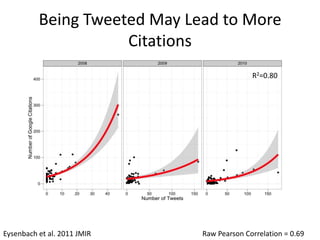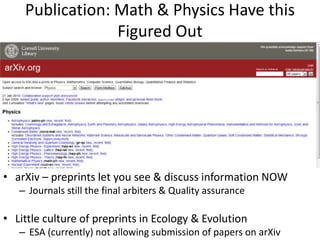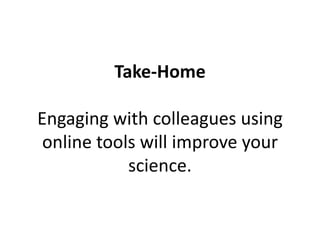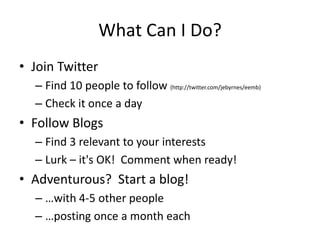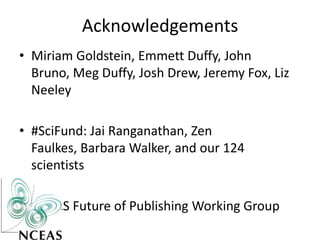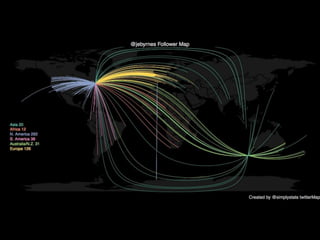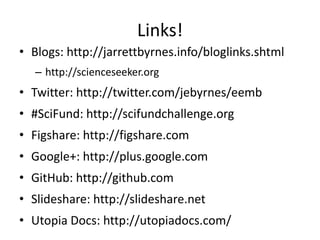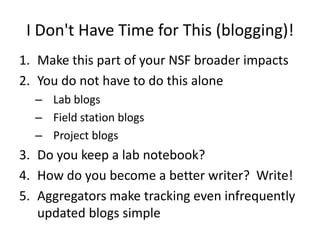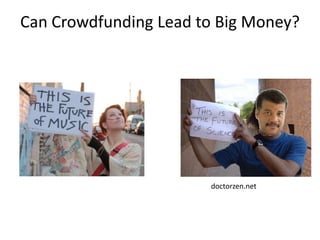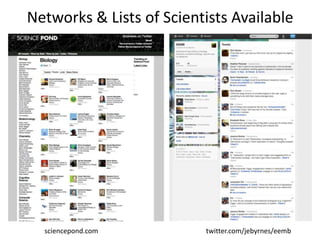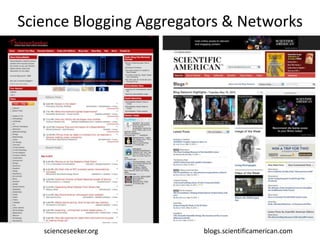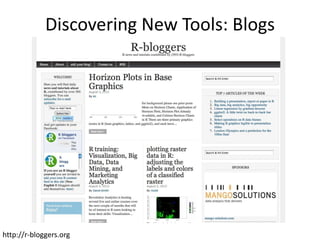Taking the Ecological Conversation Online
- 1. Taking the Ecological Conversation Online Jarrett Byrnes National Center for Ecological Analysis and Synthesis @jebyrnes http://jarrettbyrnes.info
- 2. Take-Home Engaging with colleagues using online tools will improve your science.
- 3. Where do we Discuss Science Now? Literature Colleagues Meetings
- 4. Tapestry of Online Tools StackExchange Wordpress Blogger Twitter #SciFund Figshare Google+ Github
- 5. Talk Outline 1. Enhancing Discovery 2. Online Discussion & Review 3. Online Activity Leads to Funding 4. Changing Scholarly Discourse
- 6. Blogs & Social Networks Aid Information Discovery by Connecting Scientists
- 7. Discovery: Twitter Meetings Grey literature you might have missed New tools People you may want in your network
- 10. Discovering New Mentors & Advice http://neurodojo.blogspot.ca/
- 11. Talk Outline 1. Enhancing Discovery 2. Online Discussion & Review 3. Online Activity Leads to Funding 4. Changing Scholarly Discourse
- 12. Opportunity for Critical Discussion http://dynamicecology.wordpress.com/
- 13. Opportunity for Discussion of Bigger Issues http://theseamonster.net/2011/05/forum-on-fish-food-and-people/
- 14. Solving Problems as a Group ÔÇó Venue for international collaboration to solve scientific problems
- 17. Talk Outline 1. Enhancing Discovery 2. Online Discussion & Review 3. Online Activity Leads to Funding 4. Changing Scholarly Discourse
- 19. Jai Ranganthan putting your science online for everyone Broader Scientists public research cash via crowdfunding Round 1: $73K in 45 days with 49 scientists Round 2: $100K in 30 days with 75 scientists Average Project ~ $1600 ÔÇô perfect for a grad student or pilot project! http://scifundchallenge.org
- 20. The Secret to #SciFund: Engagement Online Scientific Project presence fanbase views 1 blog post / 1 Twitter 110 project month Ôëê follower Ôëê views Ôëê 53 Twitter 1 project 1 contributor followers view Donor Money for Funding contributions research target met Average Average 20 project contribution Ôëê raised Ôëê views Ôëê $55 $1,600 1 contributor Friends and family 50 Facebook friends Ôëê 1 contributor Byrnes et al. In Review
- 21. Talk Outline 1. Enhancing Discovery 2. Online Discussion & Review 3. Online Activity Leads to Funding 4. Changing Scholarly Discourse
- 22. Rapid Sharing of Data & Results http://figshare.com http://datadryad.org http://dataone.org/find-data
- 23. Online Fingerprint as a Measure of Impact http://altmetrics.org and http://total-impact.org
- 24. Being Tweeted May Lead to More Citations R2=0.80 Eysenbach et al. 2011 JMIR Raw Pearson Correlation = 0.69
- 25. Publication: Math & Physics Have this Figured Out ÔÇó arXiv ÔÇô preprints let you see & discuss information NOW ÔÇô Journals still the final arbiters & Quality assurance ÔÇó Little culture of preprints in Ecology & Evolution ÔÇô ESA (currently) not allowing submission of papers on arXiv
- 26. Take-Home Engaging with colleagues using online tools will improve your science.
- 27. What Can I Do?  Join Twitter  Find 10 people to follow (http://twitter.com/jebyrnes/eemb)  Check it once a day  Follow Blogs  Find 3 relevant to your interests  Lurk  it's OK! Comment when ready!  Adventurous? Start a blog!  with 4-5 other people  posting once a month each
- 28. Acknowledgements ÔÇó Miriam Goldstein, Emmett Duffy, John Bruno, Meg Duffy, Josh Drew, Jeremy Fox, Liz Neeley ÔÇó #SciFund: Jai Ranganathan, Zen Faulkes, Barbara Walker, and our 124 scientists ÔÇó NCEAS Future of Publishing Working Group
- 30. Links! ÔÇó Blogs: http://jarrettbyrnes.info/bloglinks.shtml ÔÇô http://scienceseeker.org ÔÇó Twitter: http://twitter.com/jebyrnes/eemb ÔÇó #SciFund: http://scifundchallenge.org ÔÇó Figshare: http://figshare.com ÔÇó Google+: http://plus.google.com ÔÇó GitHub: http://github.com ÔÇó ║¦║¦▀úshare: http://slideshare.net ÔÇó Utopia Docs: http://utopiadocs.com/
- 31. I Don't Have Time for This (blogging)! 1. Make this part of your NSF broader impacts 2. You do not have to do this alone ÔÇô Lab blogs ÔÇô Field station blogs ÔÇô Project blogs 3. Do you keep a lab notebook? 4. How do you become a better writer? Write! 5. Aggregators make tracking even infrequently updated blogs simple
- 32. Can Crowdfunding Lead to Big Money? doctorzen.net
- 33. Networks & Lists of Scientists Available sciencepond.com twitter.com/jebyrnes/eemb
- 34. Science Blogging Aggregators & Networks scienceseeker.org blogs.scientificamerican.com
- 35. Discovering New Tools: Blogs http://r-bloggers.org
Editor's Notes
- #3: I'd like to start today with my take-home message
- #4: Information & Intellectual Exchange is the lifeblood of science. As we each learn new discoveries from our field  or outside of our field  our own work grows, changes, and improves. As we discuss our thoughts, we can shape ideas into new theories and experiments. This is how science works. Where do we get our information? Where do we discuss new ideas and theories? Well, we have three main places. This was a fantastic system, but the speed of new information transmission & the limited pool of colleagues which one can interact with on a regular basis severely hamper our ability to discover and incorporate the latest and greatest into our science in this, the age of information overload and a relentless need for answers to environmental crises.
- #5: I'm going to talk about the ways that one can use the rich tapestry of online tools ÔÇô from blogging to twitter and more ÔÇô to enhance the speed and quality of the work as a 21st century Ecologist. I say this as, undoubtedly, the tools will keep changing and evolving. But the basic principle of using new means of online communication to engage in the activities of science is a shift in perspectives, and it's my job here to convince you that it's a perspective worth embracing.Note, I'll have links to all of these and the various projects I mention in an extended version of this talk on ║¦║¦▀úShare & my website.
- #6: Today I'll be talking about several ways that taking the ecological conversation online can enhance your activities as a scientist. I'm going to talk about a few ways that online tools can speed up this process and jump over these inefficiencies using a combinations of examples and some data. Indeed, it goes beyond just information discovery, but actual discussion and interaction, so that our ideas are being shaped by a much larger circle of colleagues, and can lead to tremendous changes ultimately to the way we conduct scholarly discourse. But, let's start with information discoveryÔÇô and in particular, social networks.Let's start with means of discovering new information.
- #7: Communicating online works to aid discovery precisely because of network effects. Let's say you have three groups of scientists, and two of them begin communicating via online social networks, blogs, or what have you ÔÇô the tools, as I said, are unimportant. While information can flow freely within those clusters, it's not until more folk join that information can jump the gap. It's a network threshold effect. So, the more we all participate, the more enriched we all become ÔÇô and you'll see how this can play out in a number of the following examples. Science! It's a team sport.
- #8: Yup, I'm talking tools like Twitter. For those unfamiliar, Twitter is a tool where you select folk you want to follow, and are rewarded by a stream of the information that they post. You tweet back, sharing information or conversation. There are additional ways of organizing info, but I won't get into that here. Here's a typical snapshot from my feed. Aside from creating a collegial environment where you can interact with colleagues (no matter where they are), here are several examples of discovering new information from my own network.
- #9: For example, I study climate change. But I am not a climatologist, a paleoclimatologist, a climate modeller, etc. I try and keep up on that literature, but I want a source that will help me discover some of the big new things coming from those disciplines. Enter BLOGS like RealClimate.
- #10: Enter a growing movement of sites- the ÔÇôoverflow family, reddit and more, where one can go and leverage the power of the crowd to find answers to very targeted questions. Some of these sites, such as mathoverflow, have advanced to the point where people are asking and beginning to answer ÔÇô novel research questions. The possibilities are huge.
- #11: Finally, for grad students and those just entering the field, blogs are a great way to find advice from folk like Dr. Zen, or begin interacting with senior scientists outside of your department who may become important in a mentorship role for you ÔÇô particularly if your work takes you outside of local expertise.
- #12: So that's a brief overview of how online tools facilitate discovery of information. But what about meatier interactions ÔÇô discussion and review of literature? Blogs are a logical place to dive back in.
- #13: First and foremost, blogs can open up opportunities for critical discussion of ideas. I think Jeremy Fox is one of the finest examples of that these days ÔÇô he began on the Oikos blog, and has now taken to his own. Here is part of a wonderful discussion he has been having about Zombie ideas in Ecology ÔÇô ideas that are disproven but just won't die.
- #14: Blogs also provide a place to gather many voices, such as the amazing for a held at the SeaMonster blog. This forum brough together scientists on different sides of a common issue to discuss the relationship between fishing, food provision, and ecological integrity. Contentious stuff, but the discussion gave us, the larger scientific audience, a view into the minds of top folk in the field, and led to additional discussion from people outside of this initial circle. I hope to see more of this in the future. Who knows what may grow from it.
- #15: This logically leads to the growth and creation of new work. This is happening in mathematics. Partially at ÔÇôoverflow sites, but also in blogs and discussion boards. Michael Nielsen's book documents several wonderful examples of this ÔÇô in particular the Polymath project ÔÇô explain.
- #16: And then there's post-publication peer review. Tell the story
- #17: Most post-pub review is not that critical  rather it highlights what is new and interesting to a particular researcher about a particular piece of work. At its best it creates a discussionand may lead to new science
- #18: So, what does all of this add up to. Let's start with funding. How can online discourse lead to more science funding?
- #19: Robocop, that's how. Explain.
- #20: So, my collaborator Jai Ranganathan and I wanted to see if science could be crowdfunded, and how. Basically, when you are engaging in scientific discourse online  discussing issues relevant to you or keeping an open notebook, you are allowing the public to become involved in your work. Yes, you're doing outreach. Can that outreach translate to funding? We ran two rounds of #SciFund that have encompased ~125 scientists. Stats.
- #21: What we've found when we surveyed participants is that it all comes back to how much they were present in the online conversation. Trace pathway
- #22: So activity leads to an audience leads to funding. That's one aspect of the business of science, but, ultimately, how does all of this online activity change scholarly discourse?
- #23: But we need not be concerned just with impact  what about publication itself? How can the growth and proliferation of tools change the speed of dissemination of new information? Getting raw data and new figures and results is an obvious first step. Blogs are a great venue, but having these pieces of work in clearinghouses aids discoverability. Sites like figshare are hosting figures and data sets and giving them DOIs. Dryad and data one well, you just heard about them, so I won't go into detail
- #24: First, it provides a signature of impact of scholarly work. ( Explain altmetrics. )
- #25: For those of you who don't see the connections between information discover via social networks and the peer reviewed literature ÔÇô this is something under study. Here's my re-analysis of the data from Eysenbach et al's study of the relationship between tweets about papers in JMIR and citations ÔÇô the relationship is stronger for older papers, likely because the newer papers haven't had time to get cited yet. It's compelling, although correlative ÔÇô but it hints that work that generating interest on Twitter may be a good predictor of longterm impact.
- #26: And finally, what about changing the speed of publication itself? I'm not talking about replacing the journal system  there needs to be final arbiters of quality and a place for formal rejoinders, comment, and topic curation. But once something is done, why not put it into the eyes of the community to get valuable feedback and help spur new ideas? If this seems like madness, the math & physics community have been doing it for roughly 30 years now. Ecologists are still very hesitant, in fact.CHECK TO SEE THIS DIDN'T CHANGE AT PUB MEETING
- #33: So, it can fund a preliminary project, or grad student work. OK  can this kind of activity lead to big bucks? Yes, but it's going to require a lot more engagement and outreach and raising your status. Artists with big audiences like Amanda Palmer can raise millions of dollars, Dr. Zennot so much yet. But, imagine if XXX was there? How much could they bring in?
- #34: And scientists are using Twitter ÔÇô there's are sites like science pond, or Twitter lists of relevant scientists, like my own eemb list, where you can find people whose work and ideas are relevant to you.OK, great, but what are some meatier ways to interact and discover new information. Let's look at blogs as an example.
- #36: I also use blogs a lot for learning about tools I use ÔÇô such as R. It's actually how I got into reading science blogs in the first place. Blogs are a tremendous place to find people discussing the use of tools. For particular tools, the content can even be aggregated ÔÇô such as in r-bloogers here.But what if you want to target your information discovery even more ÔÇô and maybe give back a little? What if you have specific questions ÔÇô maybe you're wading into disciplinary areas where you are lacking in information, or want to HELP those who are asking questions in an area you have expertise?

